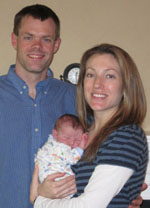|
By Dawn Brazell
Public Relations
Dinner conversations can be thrilling at
the Shotwells.
Topics range from the hot
debate about "P" values in biostatistics to the fine art of putting on
a diaper. "We can switch from one to the other just that fast," said
Matt Shotwell. He and his wife, Mary, managed to get married and have a
baby all in time to be able to return for their hooding ceremony in
MUSC's College of Graduate Studies where they both will receive their
doctorate degrees in biostatistics.
The main challenge for
them right now is getting enough sleep to string a conversation
together. "Luke is so cute, who could get any rest?" Matt said,
explaining how much their life has changed since that first day of
orientation at MUSC in 2006, when he had no idea he'd be leaving
married and with a family.
 Mary and Matt with son Luke. Mary and Matt with son Luke.
Biostatistics drew both
Matt and Mary to MUSC. Matt had graduated from East Tennessee State
with a master's degree in biology, but found a new passion during his
studies. "I fell in love with statistics and quantitative methods. That
led me down the path to this. I was looking for a way to integrate
biology and quantitative methods and biostatistics seemed like a
natural choice."
Mary, who received her
master's in marine biology from the University of Cape Town in South
Africa, was drawn to Charleston because of the Hollings Marine
Laboratory. They both ended up working on the same training grant,
mentored by MUSC's Elizabeth Slate, Ph.D. Matt, who now is an assistant
professor in the Department of Biostatistics at Vanderbilt University,
said the training grant was one of the main draws that brought him to
MUSC because it paid well and offered wonderful educational
opportunities.
Mary interviewed at
NOAA—the National Oceanic and Atmospheric Administration—at the
Hollings Marine Lab and found it was a great fit. "Academically, the
experience was great. I couldn't praise the program enough."
Mary and Matt were the
only two incoming students that year in biostatistics so they ended up
helping each other out, bonding over biostatistics. Matt said one of
their favorite activities was taking walks downtown in the evenings.
Remembering the night he proposed, Matt said it was nerve-wracking. He
loves Calhoun Mansion and intended to propose to Mary in front of the
home, but for some reason couldn't find it. He popped the question
anyway.
Matt said they weighed the
pros and cons, and decided not to wait, tying the knot on Oct. 3, 2009.
"Life goes on. You have to
push on through. In the long run, I think living your life with someone
you love and having kids could be equally fulfilling and longer lasting
than academic achievement."
They became parents April
22 at 2:26 p.m. to Luke, a healthy 6-pound-12-ounce boy. Matt, who has
struggled to get used to the baby's schedule, said it's been a tough
learning curve. "I'm sort of a worrywart anyway. I never realized how
much work it is to have a baby—just having the baby part. We haven't
even gotten that far into the parenting part. I'm surprised by how much
fluid in and fluid out he has."
Matt said what really
amazed him is experiencing the bond of parenting. "It's more intense
than you can describe to someone who doesn't have kids. That was
surprising how intensely you bond with a child."
Designing a research
program at Vanderbilt University and collaborating with biomedical
researchers, Matt is looking forward to teaching as well.
"I love the variety. I
like data analysis. I get to work in all sorts of fields of biology and
medicine. We get to do the most interesting part of science. We take
data and determine the biological and scientific significance of
it—what information can we garner from these data."
What many others dread,
Matt sees as fun. Mary feels the same way. She came to MUSC looking for
a program in quantitative methods where she could use her marine
biology background. When life with Luke settles a bit more, she plans
to teach college and wants to keep up her ties with colleagues at NOAA.
She really feels drawn to sharing her passion for biostatistics with
undergraduates. Marine scientists and biologists learn how to capture
field knowledge, but what to do afterwards can be daunting, she said.
"I'd like to teach
undergraduates taking biology and chemistry who are kind of scared of
encountering statistics that it's not as scary as it seems."
Meanwhile, she and Matt
are learning how to balance family and work. She said she's glad she
didn't put her life on hold to pursue her academic career. Planning for
their wedding actually gave her good breaks from her studies. She got
better at handling the times when she felt overwhelmed.
"It's just one step at a
time. I make a lot of lists and itemize what's most important that day
and just try to do one thing at a time."
|



 Mary and Matt with son Luke.
Mary and Matt with son Luke.